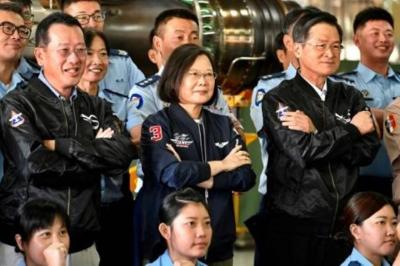Taiwan's President Tsai Ing-wen confirmed the presence of a small number of U.S. troops on the island to assist in military training, adding that she has "full confidence" that the U.S. military would defend the country if it were attacked by China. In an interview with U.S. network CNN, Tsai described Taiwan as a "beacon" of regional democracy facing a giant authoritarian neighbor, indicating that the Chinese threat is increasing "every day." A Pentagon official had previously confirmed the presence of U.S. troops to Agence France-Presse and other media earlier this month. However, Tsai's remarks are the first time a Taiwanese leader has publicly acknowledged this since the last U.S. military garrison left in 1979 when Washington shifted diplomatic recognition to Beijing. When asked about the number of U.S. troops in Taiwan, Tsai responded, "It's not the number that people think." She clarified, "We have extensive cooperation with the U.S. aimed at enhancing our defense capabilities." When asked if she was confident the U.S. would assist in defending Taiwan if necessary against China, Tsai replied, "I have full confidence" in that. During a session with lawmakers on Thursday, Taiwanese Defense Minister Chiu Kuo-cheng stated that there has long been communication between U.S. and Taiwanese forces. He added, "We have personnel exchanges, and (American soldiers) will be here for military cooperation, but that differs, in my definition, from having 'stationed forces' here."
**Military Incursions**
China considers self-ruled Taiwan to be a part of its territory and has vowed to eventually reunify the island, by force if necessary. Military threats from Beijing have escalated in recent years, heightening fears that the island, with its population of 23 million, could become a major global flashpoint. During a virtual East Asia summit held on Wednesday, U.S. President Joe Biden admonished Beijing over its actions near Taiwan. At the summit, which included Chinese Premier Li Keqiang, Biden stated that the U.S. "is very concerned about China's coercive and proactive actions... across the Taiwan Strait." Biden added during a closed session, as per a transcript obtained by Agence France-Presse, that such actions "threaten regional peace and stability." Last week, Biden stated in a televised forum that the U.S. is prepared to defend Taiwan against any Chinese invasion. The White House quickly walked back those comments after warnings from China, continuing a long-standing U.S. policy known as "strategic ambiguity," which allows Washington to assist Taiwan in building and enhancing its defenses without explicitly committing to help in the event of an attack. The U.S. severed diplomatic relations with Taipei in 1979 to recognize Beijing as the official and sole representative of China. However, Washington remains Taiwan's strongest ally and primary arms supplier, and the U.S. administration is obligated by Congress to sell arms to the island to enable its self-defense. For decades, few believed that Beijing could successfully invade, but China has significantly bolstered its military and become more aggressive toward Taiwan under President Xi Jinping. Beijing has severed official relations with Taipei and increased diplomatic, economic, and military pressure on Taiwan, as Tsai does not consider the island part of "one China." Tsai has won two elections and views Taiwan as a de facto sovereign state.
**Trip to Europe**
In her interview with CNN, Tsai reiterated her desire to have talks with the Chinese president to "reduce misunderstandings" and address the differences in their political systems, a request Beijing has thus far rejected. Defending Taiwan against China has become a bipartisan issue in Washington, which is rare, and there is growing support for the island in parts of Europe. This week, Taiwanese Foreign Minister Joseph Wu is visiting the Czech Republic and Slovakia in response to invitations from local politicians, a trip that was criticized by Beijing. He is scheduled to travel to Rome at the end of the week. On Wednesday, Politico reported that he also intends to visit Brussels. An EU spokeswoman informed Politico that they are "aware of the visit," which will be "non-political," adding, "We engage with Taiwan even in the absence of diplomatic recognition." The Taiwanese Ministry of Foreign Affairs declined to comment on reports of the minister's visit to Brussels. On Tuesday, U.S. Secretary of State Antony Blinken urged for Taiwan to have a greater role in U.N. agencies. Beijing responded to Blinken's statement by reiterating its stance that the Taiwanese government has no place on the global diplomatic stage and "does not have the right" to join the United Nations.




